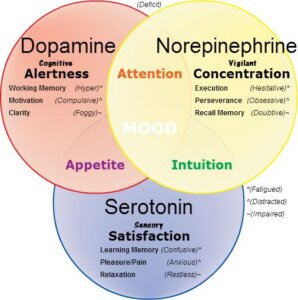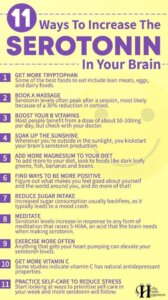Have you ever considered that a low dopamine and serotonin hormone level could be the cause of your poor fitness?
Are you aware of the two hormones that deficiency of these two may be the root of your current health problem?
Perhaps you are in perfect health.
Possibly you might not be.
Your health is probably not perfect all the time.
Alternately, your present mental health could not be sufficient for you to lead an overall healthy existence both physically and psychologically.
Dopamine and serotonin, two hormones, are important to understand under such circumstances.

The term hormone is well-known. Let’s brush up on our hormone expertise. Your body’s chemical messengers are called hormones. They go to tissues through the bloodstream. They operate gradually over time and have an impact on a variety of processes, including
• Metabolism – how your body converts food into energy
• Sexual activity
• Reproduction
• Mood Hormones are produced by endocrine glands, which are distinct cell populations.
The main endocrine glands are the pituitary, pineal, thymus, thyroid, adrenal glands, and pancreas.
Additionally, women generate hormones in their ovaries and men in their testes.
Hormones have great power.

Small amounts can result in significant changes in cells or even across your entire body. That’s why having too much or too little of a certain hormone might have negative effects.
Hormone levels can be determined through laboratory testing on your blood, urine, or saliva.
Returning to our topic of study, serotonin and dopamine are commonly referred to as the “happy hormones” because of the way they work to keep the body in balance.
These two neurotransmitters control mood and emotion, and a lack of either one can cause a variety of mental problems.
Do you believe that you are physically fit even after having mental disorders?
Not at all.
Because your physical and mental fitness go hand in hand, and because being physically and intellectually healthy is what is considered to be exceptional fitness.

Dopamine and serotonin are members of the same class of neurotransmitters known as monoamines.
Neurotransmitters are chemical messengers that move information between neurons and are involved in a number of physiological processes, including sleep, metabolism, memory, and emotional stability.
There are some medical disorders that can result from an imbalance of these neurotransmitters.
To help you learn more about dopamine and serotonin, let’s talk about them a little bit more.
Dopamine:
When you accomplish a goal, your brain releases the neurotransmitter dopamine because it anticipates a reward.
Additionally, it affects motivation, sleep, focus, and memory.
Dopamine influences your motor function, emotions, and even your decision-making by playing a part in neurological and physiological processes. It has also been connected to mental health problems. Dopamine always works in conjunction with other neurotransmitters, such as serotonin, and never by itself.
Dopamine has a number of uses, including

• Memory and attention
• Alertness
• Motivation
• Emotions and mood
• Motor skills Flow of blood
• Digestion
• Executive ability
• Heart and kidney performance
• Processing of pain
• Insulin regulation and pancreatic function
• Pleasure-seeking and reward-seeking actions
• Sleep
• Stress reaction Euphoria may result from a rise in dopamine.
High dopamine levels can result in:

• Hallucinations
• Mania
• Delusions
• Obesity
• Schizophrenia
• Addiction
Dopamine deficiency may cause:
• Difficulties moving
• Poor motor skills
• Inability to concentrate
• Having lost motivation
• Pains and aches
• Muscle pain
• Loss or gain of weight
• Loss of equilibrium
• Fatigue – Low vigour
• A low sense of self
• Sleep disturbance
• Having lost motivation
• Pains and aches Muscle spasms Gaining or losing weight
• Loss of equilibrium
• Distracting thoughts
• Mood changes
• Delusions
• Hallucinations
A low level of dopamine is also the result of Parkinson’s disease which is a central nervous system ailment that impairs movement and results in tremors, muscle stiffness, and difficulty walking because of a loss of coordination and balance.
What about another neurotransmitter Serotonin?
Serotonin is a neurotransmitter that is produced in the brain and is also present in the blood, platelets, and the central nervous system. It is also a large component of the digestive system. Tryptophan, an amino acid that we obtain through diet and is primarily found in cheese, almonds, and red meat, is used to make serotonin. Controls bowel movements and motility, among other things.

Stimulates the region of the brain that regulates nausea as a way to get toxins out of the stomach.
• Reduces anxiety, depression, and sleeplessness while regulating mood and sleep
• Platelets release this substance, which aids in wound healing by making blood vessels smaller.
• Preserves bone health (abnormally high serotonin levels may cause osteoporosis and makes the bone weak)
• Limits libido (libido is enhanced with low levels of serotonin and reduced with high levels of serotonin)
Selective serotonin reuptake inhibitors, which are used as antidepressants, are used to treat low serotonin levels. These medications have the potential to occasionally elevate serotonin levels in an unnatural way, resulting in serotonin syndrome. These signs include:
• Twitching muscles;
• shivering
• Diarrhea
• Confusion
• A fast and irregular heartbeat
• Blood pressure problems
• Seizures
• Memory issues
• Sleep issues
• Lack of appetite
• Irritability
• A low sense of self
By this point, you are probably well aware of the neurotransmitters that move electrical messages among brain cells.
The availability of drugs to treat serotonin and dopamine abnormalities has increased significantly during the past several decades. Many mental health issues’ symptoms can be treated with these prescription drugs.
However, a comprehensive range of adverse effects, ranging from drowsiness to sleeplessness, is possible. Their efficacy differs from person to person as well.
Before committing to medication, some people want to explore alternative therapies.
Why not try one of these 10 non-pill methods to raise dopamine and serotonin levels:
1. Spend time outside.
Humans used to spend the majority of their time outside. Nowadays, a lot of individuals spend their workdays inside, seated at desks with artificial illumination. Five minutes spent outside in a natural setting has been shown to have positive effects on mood, motivation, and self-esteem. Serotonin and dopamine production is correlated with exposure to sunlight. Even a quick stroll across the park might make you feel better.
2. MEDITATION
Relaxed and intentional contemplation is the practice of meditation. It frequently goes along with breathing exercises. Dopamine release is increased during meditation, according to research. It can ease tension and foster a sense of tranquilly within.
3. GRATULATION
The reward system in the brain is impacted by appreciation, according to scientific studies. Dopamine and serotonin are released concurrently with it. Happiness has been inversely correlated with gratitude. Numerous studies have been conducted on a technique known as the “three blessings exercise.” Write down three things you are grateful for each night for a week. People who finish this activity typically report feeling happier and less depressed. Up to six months can pass before their mood starts to improve.
4. GORGEOUS MEMORIES
Researchers have looked into how mood and memory interact. They concentrated on the part of the brain connected to attention, the anterior cingulate cortex. Serotonin levels in that area decreased as people relived painful memories. Serotonin levels increased in those who focused on pleasant recollections.
5. NEWNESS
Dopamine is released by the brain as a response to new experiences. By searching out new experiences, you can naturally raise your dopamine levels. Any type of experience will be effective. You may start a new recipe or easy hobby. Or, you may take on a great adventure like skydiving. Your brain is more likely to reward you with dopamine if you are unfamiliar with the action.
6. ACHIEVEMENT OF GOALS
Dopamine is released by our brains when we accomplish one of our goals. This dopamine rush is incredibly satisfying to the brain. By pursuing another objective, it tries to get more dopamine. Dopamine levels often rise as goals get bigger. To increase your chances of success, it is advisable, to begin with, modest objectives. Long-term goals can be attained by combining short-term goals (and a bigger reward). Your brain’s dopamine release is maintained by this pattern.
7. WORKOUT
A minimum of 30 minutes of daily exercise enhances mood in general. Long-term aerobic exercise raises serotonin levels in the brain, according to research. Serotonin can lessen acrimony and depressive symptoms. It also promotes composure.
8. CUISINE
The impact of diet on mental health is also possible. For as long as you drink coffee, serotonin and dopamine levels rise. The impact of diet on mental health is also possible. For as long as you drink it, coffee raises your levels of serotonin and dopamine. When you quit drinking coffee, withdrawal symptoms will set in. Your brain will behave as though there is a deficit because it is accustomed to high levels of neurotransmitters. The brain needs up to 12 days of caffeine-free eating in order to function normally. Serotonin levels are increased by omega-3 fatty acids without withdrawal. They facilitate transport by assisting serotonin in triggering nerve cell receptors. Omega-3s have been demonstrated in numerous trials to help lessen depression symptoms. Salmon and other cold-water fish contain omega-3 fatty acids.
9. EXTRACTIVE OILS
Essential oils are all derived from plants. These oils frequently have therapeutic qualities. According to one study, the therapeutic properties of bergamot, lavender, and lemon essential oils stand out. They cause your brain to release serotonin and dopamine by using your sense of smell. Remember to always abide by the directions printed on the bottle. Despite being “natural,” some essential oils can be harmful if used improperly. Young children should not play with essential oils.
10. Therapy
According to research, mood changes might impact how serotonin is made in the brain. This suggests that serotonin production and mood are influenced by one another. Psychotherapy frequently aids individuals in feeling happier. It’s possible that therapy can help patients have higher serotonin levels.

Conclusion:
After learning more about dopamine and serotonin, you’ll be compelled to take action to ensure a balanced intake of both neurotransmitters. Of course, everyone wants to be in excellent physical condition, and the ideal treatment for this is a natural one with no side effects. These ten techniques, while they can increase your neurotransmitters, do not replace medical attention. Always seek medical or therapeutic advice if you have mental health issues. A mental health specialist can advise you on the strategies that will work best for your particular circumstance. Taking medication or going to counselling is not shameful. They are popular options for treatment among many.
-End-
For other interesting blogs, click below:
How speed reading can boost your memory to impact your personal growth?
How Life coaching can lead you to an Incredible life you can’t even imagine?


Very helpful information
Thank you so much